We are extremely grateful to the BSDB for giving us the opportunity to attend the Biologists @ 100 conference in Liverpool. As PhD students investigating spinal cord injury and regeneration, this experience was invaluable. It allowed us to connect with scientists, gain insights into diverse fields and explore potential collaborations.
Simran Singh
The meeting started off with an exciting early career research session, offering a unique chance to interact with individuals who have pursued various scientific career paths. A highlight for me was the keynote talk by Dr. Richard Server, co-founder of bioRxiv and medRxiv. He shared his career trajectory, discussed the impact of bioRxiv on publishing – especially during the Covid-19 pandemic –and highlighted the numerous transferable skills gained from an academic career.
The following three days were filled with inspiring and thought-provoking scientific talks. One of the first talks was by Professor Muzlifah Haniffa, recipient of the Cheryll Tickle Medal. She described herself as “born into immunology, married into developmental biology, and became best friends with single-cell omics”. Her research focuses on decoding the human immune system, particularly the spatial and temporal composition of immune cells and their roles beyond immunology, such as in development. Additionally, her work on the Human Developmental Cell Atlas, integrating developmental disorders, has had a profound translational impact. Throughout her talk, she emphasised the importance of interdisciplinary approaches and collaboration in science. She is also a strong advocate for women in STEM and leadership. I particularly liked her powerful statement “Women should continue to thrive in science not despite but because of the system”.

Image: Fantastic end to day 1 of the conference with the welcome reception at Museum of Liverpool
Another talk I enjoyed was by Professor Helen Skaer, winner of the BSDB Waddington Award for her outstanding research, contributions to the developmental biology community and excellent mentorship. Her research explores how cells work together to make an organ of the right shape, size and in the right place, with a focus on renal tubules in fruit flies, which are highly consistent. She eloquently described her research journey from studying Mercierella Enigmatica (reef building tubeworms) to fruit flies and shared some of her “most exciting moments” in the lab. One such moment was the identification of a ‘tip cell’, the master regulator that when ablated would arrest cell division of the renal tubules. My favourite part was due to the lack of a laser ablation machine, Professor Helen Skaer had to come up with a creative solution to manually “suck up” the tip cell. It reminded me theimportance of being creative in research and not being afraid to think outside the box.

Image: Winner of the BSDB Waddington Award (Professor Helen Skaer)
Overall, I had a great time at the Biologists@100 conference. It was a fantastic opportunity to hear talks from scientists across the world. I am now ready to go back into the lab feeling more inspired than ever!
Renato Duarte Dos Santos
Spreading science for 100 years, The Company of Biologists and BSDB have delivered an amazing event full of opportunities to learn more about the current work in developmental biology, but also in environmental awareness and career pathing in biology. This year, the developmental biology showcase at the conference had a clear focus on the role of signal patterning and mechanical signaling, which has been shown to affect multiple processes that we tend to view as solely based on biochemical reactions.
I had a special interest in the work done by Dr. Muzlifah Haniffa, awarded the BSDB Tickle Medal for her involvement in the Human Development Cell Atlas, a project aiming to incorporate single-omics from all human cells that intervene in human development. I believe this tool will become intemporal for the world of science, with applications for all the multitude of biomedical-related fields.
Another work that caught my eye was the development of a new barcoding method and bioinformatic processing capable of improving the output of single-cell expression analysis, increasing the sampling and reducing substantially the price in comparison with the current market offer (Maizels et al., 2024). This amazing work has been done by Dr. Rory Maizels while as a PhD student. His brilliance and achievements have led him to be awarded the well-deserved BSDB PhD student Beddington Medal. Another approach that I found very interesting was the use of the cell shape to determine the cell type and cell fate, like a pseudo-time analysis (Pönisch et al., 2024 preprint). This innovative work was made by Ewa Paluch from the University of Cambridge.
Besides development talks, there were also some morning plenary talks about climate change and biodiversity loss to help spread awareness about this urgent global matter that hasn’t been handled so far as it should.

Image: Jane Francis talk – British Antarctic Survey

Image: Lunch, posters and exhibition
I also found the early-career researcher career session quite insightful. It helped me and most likely many to gain a realistic view of the current scientific paradigm and the many options we biologists possess in terms of profession. The chance to have a one-to-one talk with a professional of each career path was for sure one of the most useful experiences. I also have to mention the gala dinner, which was of the highest luxury in a mouth-dropping location, the St George’s Hall. Overall, the conference was amazing, full of great talks, opportunities to network with high-tier researchers, and to enjoy the scientific community at its best.

 Images: ACC Liverpool
Images: ACC Liverpool


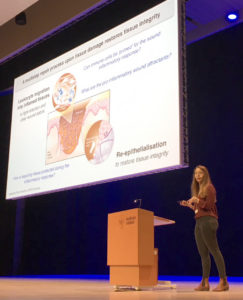 Program – We aimed to have a general scientific program covering all aspects of Developmental Biology in plants, invertebrates and vertebrates. With Tom Jessell (Columbia University, NY. USA) as our EMBO-sponsored plenary, there was a strong emphasis on nervous system development (Session 1 -13 talks), which included development of motor circuits, visual circuits, enteric nervous system, regeneration, neural crest, evolution and single cell transcriptomics. Highlights of this session were Tom’s superb talk who explained how they pick apart the identity and function of interneurons, and the presentation by Igor Adameyko (Karolinska Institute, Sweden) about single cell transcriptomics in neural crest development. Session 2 (15 talks) was on organogenesis & morphogenesis and covered mathematical modelling of development, mammalian blastocyst, pancreas, heart and kidney development, and vertebrate genetics. A particular highlight was Leif Andersson’s (Uppsala University, Sweden) talk who illustrated wonderfully how structural genomic changes contribute to dramatic
Program – We aimed to have a general scientific program covering all aspects of Developmental Biology in plants, invertebrates and vertebrates. With Tom Jessell (Columbia University, NY. USA) as our EMBO-sponsored plenary, there was a strong emphasis on nervous system development (Session 1 -13 talks), which included development of motor circuits, visual circuits, enteric nervous system, regeneration, neural crest, evolution and single cell transcriptomics. Highlights of this session were Tom’s superb talk who explained how they pick apart the identity and function of interneurons, and the presentation by Igor Adameyko (Karolinska Institute, Sweden) about single cell transcriptomics in neural crest development. Session 2 (15 talks) was on organogenesis & morphogenesis and covered mathematical modelling of development, mammalian blastocyst, pancreas, heart and kidney development, and vertebrate genetics. A particular highlight was Leif Andersson’s (Uppsala University, Sweden) talk who illustrated wonderfully how structural genomic changes contribute to dramatic 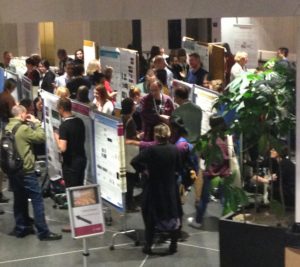 phenotypic evolution in birds, with particular emphasis on behaviour and plumages. Session 3 (8 talks) was on stem cells & regeneration which included a huge variety of science, including the role of forces in developing stem cell niches, regeneration in salamanders, skeletal muscle, tissue repair and regeneration and organisation in plants. A highlight was Ari Pekka Mahonen’s presentation who presented his work identifying a core regulatory network within the cambial stem cell niche in Arabidopsis.
phenotypic evolution in birds, with particular emphasis on behaviour and plumages. Session 3 (8 talks) was on stem cells & regeneration which included a huge variety of science, including the role of forces in developing stem cell niches, regeneration in salamanders, skeletal muscle, tissue repair and regeneration and organisation in plants. A highlight was Ari Pekka Mahonen’s presentation who presented his work identifying a core regulatory network within the cambial stem cell niche in Arabidopsis.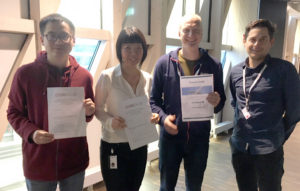

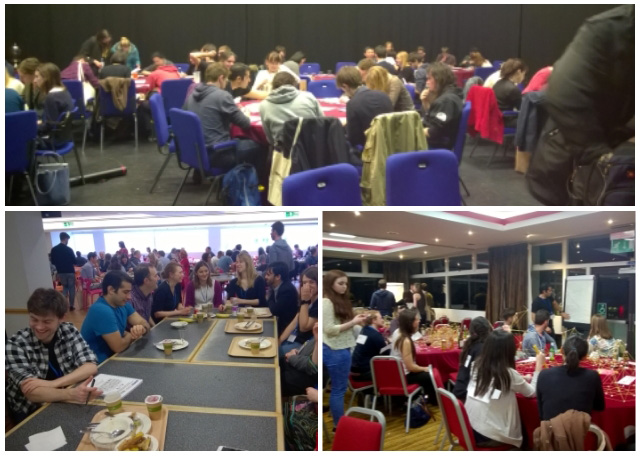
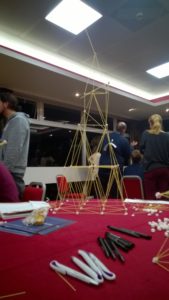 This year the reps decided it would be fun to do something more interactive for the student/postdoc social. We randomly attached a name to the back of every guest, where each name was one-half of a famous pair, such as Romeo and Juliet. Each guest could not see their own name but could see the names of other guests. Using yes-no questions, each guest had to work out who they were and then find the other half of their pair. Each pair were given the task to build the tallest possible tower using marshmallows and spaghetti. The pairs were then grouped into teams of ten which competed against each other in a round of science pictionary.
This year the reps decided it would be fun to do something more interactive for the student/postdoc social. We randomly attached a name to the back of every guest, where each name was one-half of a famous pair, such as Romeo and Juliet. Each guest could not see their own name but could see the names of other guests. Using yes-no questions, each guest had to work out who they were and then find the other half of their pair. Each pair were given the task to build the tallest possible tower using marshmallows and spaghetti. The pairs were then grouped into teams of ten which competed against each other in a round of science pictionary.